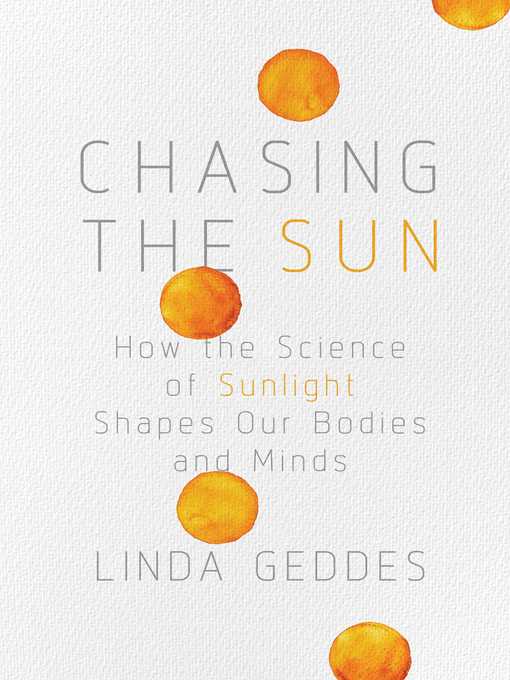
Chasing the Sun
- اطلاعات
- نقد و بررسی
- دیدگاه کاربران
نقد و بررسی

August 12, 2019
Science journalist Geddes (Bumpology) comprehensively and comprehensibly looks at how sunlight and darkness influence human health, educating her audience with a mind to them “forging a healthier relationship with light.” She opens with the science of circadian rhythms, which derive from the pineal gland, keeping her explanation nontechnical by illustrating it with the story of a man who, in suffering from non-24-hour sleep-wake disorder, has lost any biological connection to the sun. Similarly, her experiences among the Amish enable her to describe what pre–Industrial Revolution life was like, “when we had a more direct relationship with the sun,” and she makes the concept of jet lag management accessible through a sleep expert’s mechanism for predicting the outcome of NBA games. Other sections deal with the effects of irregular or night-time work shifts on the body’s metabolism, the importance of vitamin D in protecting people from the ill effects of sunshine, and seasonal affective disorder. While there’s not much here that will be new to health or science buffs, Geddes has done a great service to those who struggle to get a good’s night sleep by placing so much information in one place. This clearly written book will leave readers better informed and, hopefully, better rested.

September 1, 2019
An exploration of the effects of the sun on our physical and mental health. Light plays a critical part in the daily and seasonal rhythms of our lives. It touches on all manner of bodily function--particularly hormonal and enzyme release--and synchronizes the body's cellular clock. As science journalist Geddes (Bumpology: The Myth-Busting Pregnancy Book for Curious Parents-To-Be, 2014) writes in this bright and curiosity-stoking introduction to chronobiology, these processes are closely linked to circadian rhythms. As a species, we haven't shuffled to the circadian beat for centuries, and we have paid a price for not paying attention to the natural cycles of light and dark. Interrupt the master clock, and the first thing to go is intricate thinking. The brain uses sleep time to replenish energy molecules expended during waking hours. Without adequate sleep, alertness suffers, speed and reaction time diminish, and depression lurks. Even the moderately sleep-deprived human has their hormones disrupted and will experience muscle degeneration, an increase in fat tissue, and general sickness. "Sleep deprivation," writes the author, "winds its tentacles around pretty much every physiological process going....Chronic inadequate sleep precedes the onset of Alzheimer's disease, cancer and various psychiatric illnesses; it is also associated with heart disease, obesity and diabetes." Geddes investigates a variety of topics related to light and sleep, including artificial lighting, vitamin D supplements, seasonal affective disorder, light therapy, and the cardiovascular system's circadian variations. The author is a sure hand when it comes to explaining the various biological interactions and a steady voice in calling for lifestyles more in sync with our master clocks and less hidebound by work or tradition. "It doesn't matter when you start work, so long as you get the job done. It's about internal time, not what the clock on the wall says." A sparkling story about how we can forge a healthier relationship with light.
COPYRIGHT(2019) Kirkus Reviews, ALL RIGHTS RESERVED.

September 15, 2019
Science journalist Geddes, author of Bumpology (2014), explores the sun's myriad impacts on our minds and bodies, and the ways that electric lighting, shift work, and other hazards of the postindustrial age have weakened our relationship with the sun. Humans have numerous internal clocks in our bodies, all controlled by the suprachiasmatic nucleus, the master clock that aligns with the light-dark cycles of the natural world. Access to sunlight therefore affects not just sleep schedule but all kinds of bodily processes, including blood pressure, creation of healing cells, and speed of responsiveness to medications ranging from aspirin to the drugs used in chemotherapy. Geddes searches for solutions to circadian desynchrony in a range of unexpected locations: an Italian psychiatric ward that treats depression with a combination of bright light exposure and sleep deprivation; Amish homes that are unconnected to the electrical grid; a German city that aspires to use sleep research to become the first chronocity. This book is an engaging and informative reminder of the sun's centrality to human evolution, biology, and daily life.(Reprinted with permission of Booklist, copyright 2019, American Library Association.)




دیدگاه کاربران